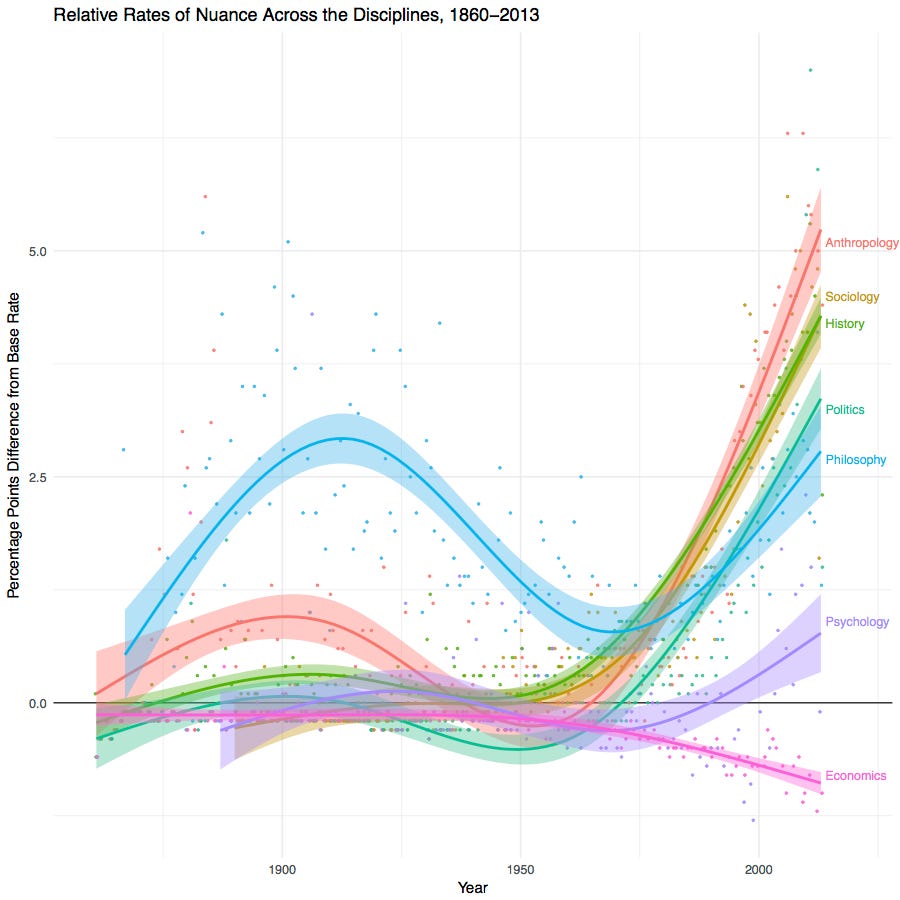WITI - The Nuance Edition
At this point, I hope most of you have figured out that my writing has almost entirely shifted over to my daily newsletter, Why is this interesting? (WITI). I figured I'd post today's email so you could get a taste. For those of you that subscribe to this site, I didn't copy any of the emails over, so please go subscribe if you'd like to start receiving it. We're doing good work and having fun. Separately, I'm hard at work on Variance, my new company, and we're hiring for a few roles.
I was struck reading this weekend’s New York Times Magazine by calls for more nuance in back-to-back articles. The first came in a piece from Dan Brooks about the narrative around the way violence is portrayed in the new Joker movie:
Legitimate movies are about complicated protagonists who combine good and bad qualities; superhero movies are about two guys, one good and one evil. By combining them into a single guy, won’t this movie cause dummies to think the Joker is good? To ask the question is to argue that nuance is dangerous. By fretting over Arthur Fleck’s sympathetic qualities, progressive-minded critics are demanding the same sort of bright line between good and evil that makes comic-book movies so boring.
The second came from a slightly-more-interesting-than-I-expected interview with Bill Maher. In response to a question about the controversy that surrounded Maher using the N-word in a joke on his show, he answered:
If we were living in a country that could handle nuance, I’d be happy to talk about it, but we’re no longer in that country. There’s no winning there. … We live in an era where I don’t think people’s main focus is the truth and/or sussing out something valuable or teachable. We live in a time in which people are more concerned with scalps and clicks.
Why is this interesting?
Most of the conversation around nuance quickly gets political, and we have a strict no domestic politics rule here at WITI, but I think there’s a broader question about both the word and idea that is worth exploring. Mainly, what do people mean when they talk about nuance? And do we need more nuance or less?
First off, true nuance does exist and we often miss it. This is the point of expertise researcher Philip Tetlock’s (by way of Isiah Berlin) distinction between foxes and hedgehogs (“The fox knows many things, but the hedgehog knows one big thing”). The fox offers more in the way of shading between black and white than hedgehogs, who have more simplified world views. As I covered in WITI 9/16 - The Foreign Policy Edition, Tetlock’s research also points to the media’s preference for hedgehogs, as their approach to interpreting the world makes them better talking heads. But his view is quantitative, not qualitative. As a researcher, he is focused on how people make measurable and accurate predictions, not the narratives we build around them, and his preference for foxes comes out of the data.
When it comes to narrative, there’s another side to this story, and it’s much more related to Maher’s stance (a hedgehog if I ever saw one). Calling for nuance is an easy way to derail an argument. In my search to think this through I stumbled on a 2017 paper from the journal Sociological Theory titled, appropriately enough, “Fuck Nuance”. Written by Kieran Healy, an assistant professor at Duke, the paper tracks the rise of the word “nuance” in the discipline of sociology and the dangers that come with its overuse. (If you’re not up for reading the paper, there’s a good interview with the author from the Chronicle of Higher Education.) He offers up three “nuance traps”: The fine-grain trap (“a rejection of theory masquerading as increased accuracy”), the conceptual framework trap (“ an evasion of the demand that a theory be refutable”), and the connoisseur trap (“the insinuation that a sensitivity to nuance is a manifestation of one’s distinctive … ability to grasp and express the richness, texture, and flow of social reality itself”).

It’s a combination of fine-grained and sophistication arguments that we see most often. Calls for nuance are a kind of rhetorical trick: An easy way to derail a disagreement without actually offering any nuance yourself. In the Joker piece Brooks is calling out the media for overusing this technique, and then, just a few pages later, Maher attempts to do exactly that. In “Fuck Nuance” Healy writes, “there is a desire to equate calling for a more sophisticated approach to a theoretical problem with actually providing one, and to tie such calls to the alleged sophistication of the people making them.”
Where do I fall on all this? When it comes to Maher, his kind of reasoning was dispatched with by John Herrman in the same magazine a year ago:
Calling for nuance is an interesting admission: It allows that the person lacking nuance has a strong, if overstated, point. (We rarely request nuance from more powerful enemies; they’re seen as sinister and dishonest, not insufficiently unsubtle.) The nuance-askers tend to be facing people whose anger they cannot fully deny or dismiss. To respond that the issue is “actually a little more complicated than that” can sound an awful lot like saying “calm down,” and is received with according unsubtle fury.
More generally, my as un-nuanced take on all this is: I think you’re almost always better off overestimating rather than underestimating people, but I also like comic book movies, and I think there are plenty of spaces where simplified characters and narratives are perfectly fine. I think the world is more complex than can be accounted for in your average 4-minute cable news interview, but I don’t think it’s so complex that we should throw our hands up and stop trying at cries for more nuance. (NRB)